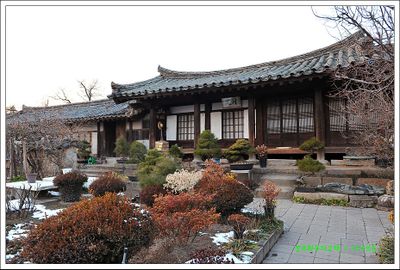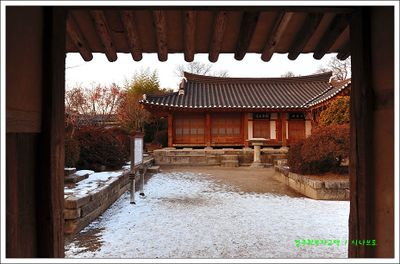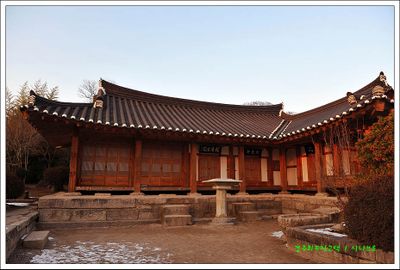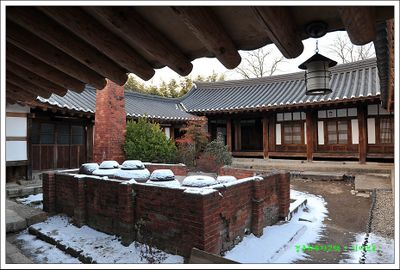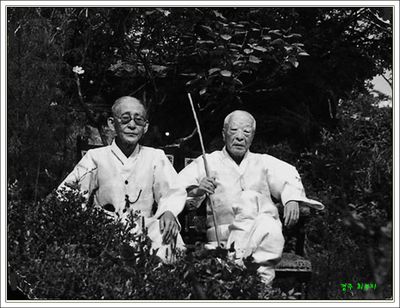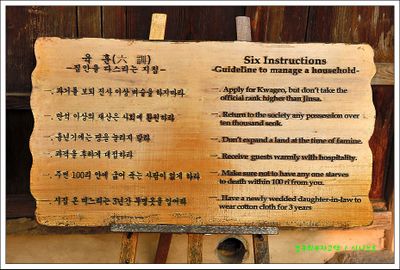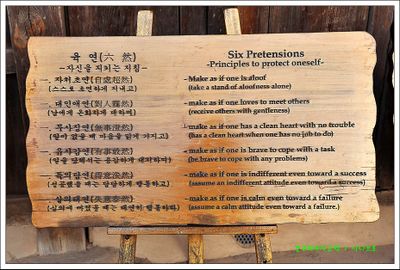Noblesse oblige
Reflections on Occupy Wall Street populist uprising, and noblesse oblige through the history of a wealthy Choi family in Gyodong, Gyeongju, South Korea
The protests that are spreading through the world all point towards the greed of bankers, and the wealthy class. Even though there is a lot of stench around this grassroot movement, there is truth behind their anger. We often simplistically appropriate the amassing of money as a part of capitalism and we do not hold profit motive accountable until we get sick to stomach with the rancid smell of unfairness.
The luster of greed is felt through our innate sense of morality. I think Michael Lewis correctly points out the core problem of our Western world to be the loss of moral leadership. The French phrase noblesse oblige literally means "nobility obliges." According to Dictionnaire de l’Académie française, it means:
- Whoever claims to be noble must conduct himself nobly.
- (Figuratively) One must act in a fashion that conforms to one's position, and with the reputation that one has earned.
In other words, a responsible wealthy should live and act accordingly, not in a piggish, greedy manner. Not only do wealthy have responsibility live as such, but all people do, as we are all in debt, first to G-d, secondly to our families, and to others. There are probably many, both living and historical, examples of people living by such principles, but one story I had recently read about came to my mind this morning. It's about a famous, wealthy family with a surname of Choi who had lived by these old principles.
(NOTE: I have tried to give little more historical and cultural context with explanations as needed.)
There is an old saying that a wealth is difficult to keep over 3 generations (富不三代), but the Choi family continuously stayed wealthy for well over 12 generations, or for about 400 years. Joon Choi, the last generation of the wealthy Choi, set a perdurable example by stating that "riches is like excrement in that it stinks if it is stored at one place, but it becomes like a fertilizer when it is spread out abroad," and donating most of his wealth to the national (underground) independence movement of Korea during the Japanese Occupation and to an university in Daegu in 1950. The question that has been raised about this family is how they were able to maintain the wealth in the family for such a long time, starting with Kuk-seon Choi in 1600s and to Joon Choi in 1950s. They seemed impervious to famine, populist riots, government changes, and other external factors of the society that had either destroyed or enervated many wealthy families during that time. After some probing it turned out the secret was in their family education that was passed down through generations. There were six core instructions and six attitudes.
SIX INSTRUCTIONS (with my explanations)
- Apply for Gwageo, but don't take an official rank higher than Jinsa.
- Gwageo: a literary examination testing on the knowledge of Four Books and Five Classics from neo-Confucian interpretation. A total of 14,620 men passed this examination over the course of the Joseon dynasty (500 years).
- Jinsa: "literary licentiate," a low-level official rank.
- Explanation: As a yangban (scholar/official) class, this statement instructs to maintain their position in the society as a yangban through the examination, but keep a certain distance from the governmental powers. Jinsa is a minor rank, which doesn't have any real power, but merely a social acknowledgement as a seonbi (a scholar). In a very hierarchial society, you need at least a minor rank to maintain your wealth, but do not try to gain more power and authority.
- Context: During Joseon dynasty, almost all worthy jobs were one of governmental positions, especially for the yangban class. The society was largely divided into two, the small, ruling yangban class, and the rest, which included the merchant class, the peasants (who were mostly tenant farmers), and the outcaste, untouchables (aka baek-jeong: blacksmiths, butchers, etc.; somewhat akin to burakumin of Japan.) Of course there was a royalty class above all.
- Return to the society any possession over ten thousand seok.
- seok: a unit used to count the amount of grain. 1 seok of rough rice is equal to 100 kilograms (~ 220 lbs.)
- Explanation: This could be somewhat of a paradoxical teaching, but it is an instruction for restraint, which comes from a clear understanding of virtue. This may be why the household was widely respected. Choi family's children had to learn to restrain their desire to amass wealth. The records show that they collected only 40% of the produce of tenant farmers compare to the average of 70% at the time. This allowed the benefits of wealth to spread widely. It was said that many tenant farmers requested to farm for the Choi family and they worked harder, resulting in increased wealth for the family. This is similar to the win-win ideals of the American enterprises.
- Context: The material unit of wealth was the amount of grain, and the acreage of land one owned at the time. The initial distribution of land was made by the royal court according to the rank and inheritance. Peasant, tenant farmers, would work the land and a percentage of produce would be given to the landowner (a scholar/official class), and a percentage of that produce would then go to the royal coffers.
- Do not increase possessions during famine.
- Explanation: This instructs not to benefit from someone else's misery. This is apparently not practiced by the Wall Street. With futures, and other derivative options, people are encouraged to take bets on economy going south. Choi family was taught never to take opportunity on others' misery. It may also mean to do everything with propriety, and it dissuades one from doing anything that may earn someone else's grudge. Famine may literally be like a hell for have-nots, but it's a chance of lifetime to increase one's holdings for people with assets. There is even a mention of "a porridge rice paddy" during the Joseon dynasty. Many sold their rice paddies (land) for a bowl of porridge during famine. But Choi family did not do such things. Such noble action (or inaction in this case) probably bought people's favors.
- Receive guests warmly with hospitality.
- Explanation: Choi family's detached house for receiving visitors had enough room to accommodate 100 guests at a time. In those days you didn't have television or newspapers, so information spread through travelers, and travelers often stayed at a place reputed to be hospitable. Choi family became famous during the Joseon dynasty because of these travelers who were moved by the family's hospitality. Choi family was widely known as "a house that accumulates goodness" (積善之家), and that may be the secret behind the family's stability even during the time of social unrest.
- Context: There was a major social unrest in Korea during 1860s due to populist uprisings, political corruptions, foreign powers vying for influence, and resulting social anxiety. A Robin Hood-like organization called Hwal-bin-dang was formed and they stole from almost all of yangban or wealthy households except from Choi family's. Choi family's reputation was widely known.
- Make sure not to have any one starve to death within 100 ri from you.
- ri: about 0.25 miles, so 100 ri is about 25 miles.
- Context: It is recorded that the Choi family shared about 100 seok of rice during the time of famine or barley hump (the spring austerity period), and when famine became worse they practically shared everything they had without reserve. The expenditure of rice by the Choi family was about 3,000 seok a year. 1,000 seok was for the family members (they had about 100 servants), 1,000 seok for visitors/travelers, and 1,000 seok for helping the poor. This tradition started with the first Choi, Kuk-seon Choi, of 17th century. It is said that Kuk-seon Choi, during the famine of 1971, wrote, "What good is keeping my possessions when my neighbors are dying of starvation?" and opened his grain storage to take care of his neighbors.
- Have a newly wedded daughter-in-law to wear cotton cloth for 3 years.
- Explanation: This isn't a time of nuclear families. At least 3 generations typically lived together in the same residential complex. The key to the grain storage was normally held by the wife of the head of household during Joseon dynasty. So, the frugality of wives were important when it came to the management of household assets. A newly wedded daughter-in-law would be taught frugality, in the same manner they would be taught to be stern to their children while being hospitable to others.
- Context: They did not allow family members to eat white rice, or use spoons made out of silver during the time of barley hump. This taught children never to be liberal with wealth and this may have been an important teaching that may have contributed to the long upkeep of wealth by this family. The long history of wealth culminated in the supreme act of sacrifice to the society in 1950s.
